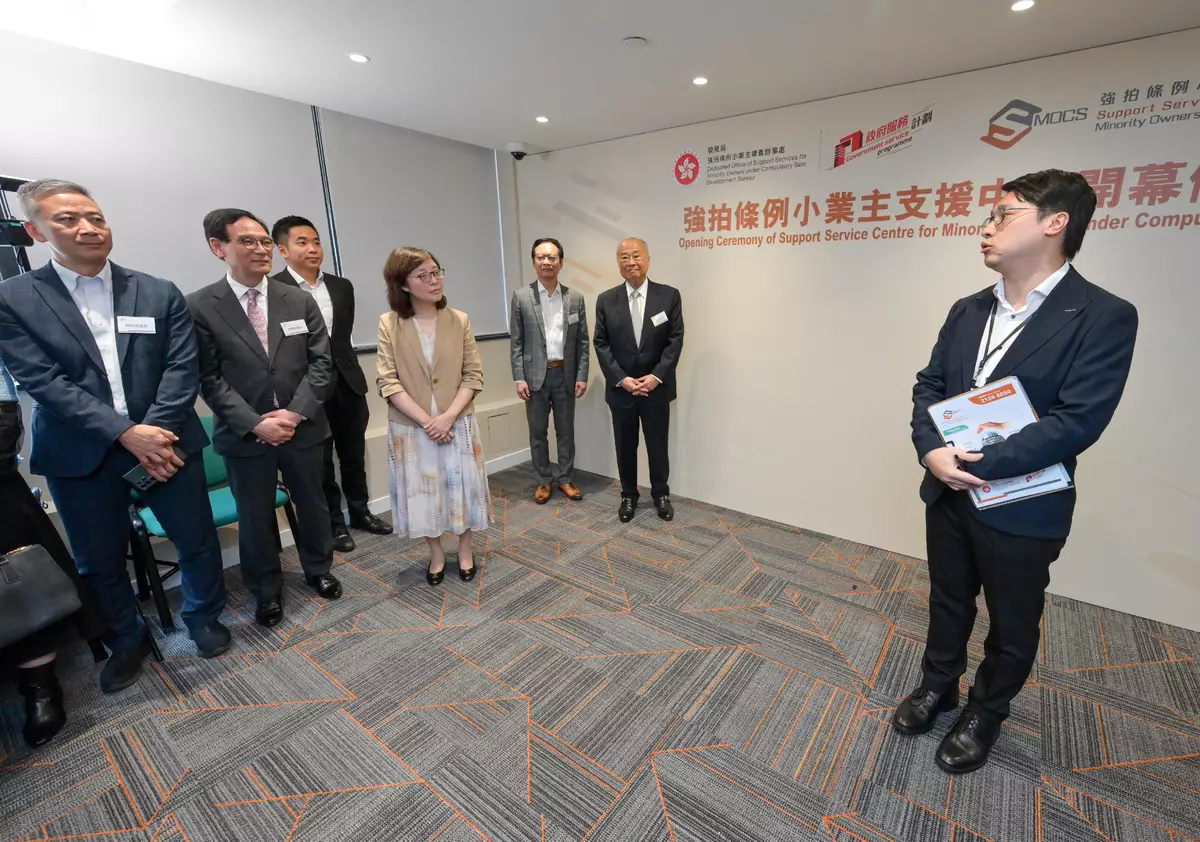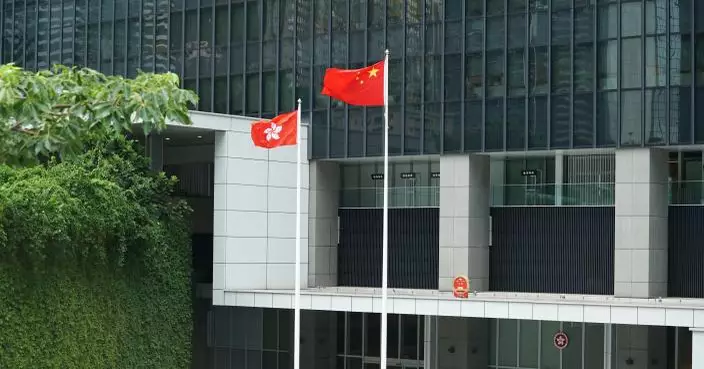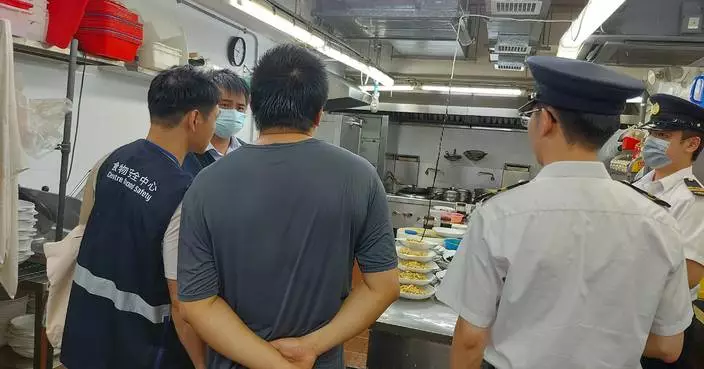Support Service Centre for Minority Owners under Compulsory Sale commences operation
The Support Service Centre for Minority Owners under Compulsory Sale (SMOCS) commenced operation today (August 27) to provide comprehensive and targeted support services to minority owners of old buildings affected by compulsory sale applications made under the Land (Compulsory Sale for Redevelopment) Ordinance (Cap. 545) (LCSRO). The SMOCS, a subsidiary of the Urban Renewal Authority (URA), is directly accountable to the Development Bureau (DEVB).
There are provisions in the LCSRO that provide a series of legal protections for minority owners affected by compulsory sale applications. The Land (Compulsory Sale for Redevelopment) (Amendment) Ordinance 2024, which was passed by the Legislative Council (LegCo) in July this year, further allows minority owners to continue occupying their properties for not more than six months after the completion of compulsory sale.
To provide further protection to minority owners in addition to the above legal protections, the Dedicated Office of Support Services for Minority Owners under Compulsory Sale (DOSS) of the DEVB and the SMOCS supervised by the DOSS will provide support services to minority owners at different stages of the compulsory sale application process, so as to help them understand their statutory rights and obtain adequate protection.
The Secretary for Development, Ms Bernadette Linn, said, "The amendments to the LCSRO will come into effect in mid-December this year at the earliest. The DOSS and the SMOCS have commenced a series of public education and publicity on the LCSRO, focusing particularly on the concerns of minority owners, such as how to deal with the developers' notices of application for compulsory sale and the subsequent legal proceedings, how to assess whether the acquisition prices offered by the developers are reasonable, and how to obtain relevant information and professional services, to ensure that they are adequately protected. By connecting to different networks including local organisations such as District Councils and District Services and Community Care Teams (CareTeams), relevant professionals such as lawyers, surveyors and mediators, as well as designated non-governmental organisation, the SMOCS endeavours to provide one-stop, more comprehensive and targeted support services to minority owners."
The Secretary for Development expressed her gratitude in particular to the URA for providing the resources to set up the SMOCS to implement the support work/services under the steer of the DOSS of the DEVB. The SMOCS operates entirely independently from the URA and is accountable to the DOSS of the DEVB, to which it will report regularly on its operations and submit reports on its work. The DOSS will be responsible for formulating regulations on support services and codes of practice for the operation of the SMOCS to ensure that the relevant policies are implemented and run smoothly.
Through various networks, the SMOCS will step up publicity and public education at the district level to enhance the understanding of the public and minority owners of old buildings on private property acquisition activities and the compulsory sale application mechanism. To address the needs of minority owners affected by compulsory sale applications, the SMOCS provides free preliminary professional advice to minority owners in the form of seminars. The SMOCS also provides, free of charge, referrals for legal and valuation professional services (if litigation is required), emotional counselling and assistance in identifying alternative accommodations. In addition, the SMOCS provides subsidies to minority owners seeking professional mediation and independent property valuation services.
Ms Linn said, "We have thus far secured the support of over 60 lawyers and about 30 surveyors to provide free preliminary professional advisory services in the form of seminars to minority owners affected by compulsory sale applications under the arrangement of the SMOCS."
Ms Linn added, "Another function of the SMOCS is to enable and encourage minority owners to participate in mediation, so as to resolve compulsory sale disputes through mediation instead of litigation. Therefore, apart from providing minority owners with a list of accredited mediators, the SMOCS will also provide two types of subsidies to minority owners, one to subsidise professional mediation services and the other to subsidise independent property valuation services, so as to assist minority owners in obtaining independent third-party valuation reports on the existing use values of their properties and the redevelopment values of the relevant lots, which will facilitate them in deciding whether or not to accept the applicants' acquisition offers or to continue to litigate in respect of the compulsory sale applications. We hope that more professionals will join the SMOCS's network in the future to provide services to minority owners."
If the minority owners decide to proceed with the litigation after mediation fails, the SMOCS will provide them with referral lists of legal and surveying professional services required in the litigation for reference. Also, the Government will, after the LegCo resumes, seek funding approval from the Finance Committee (FC) of the LegCo to create two permanent judicial posts at the directorate level for the Lands Tribunal (Tribunal). Moreover, the Government will seek approval from the FC as soon as possible for the Government to provide guarantee for the dedicated loan scheme to assist eligible minority owners in obtaining bank loans to address their cash flow problems arising from the engagement of legal and other professionals to deal with compulsory sale litigation. The minority owners can repay the loans upon the granting of cost orders by the Tribunal at the end of the hearing (the Tribunal usually orders applicants for compulsory sale to reimburse the reasonable expenses incurred by minority owners for litigation).
For details of the opening hours and the services of the SMOCS, please visit its website (www.smocs.hk). Members of the public may call the SMOCS at 2156 8050 during opening hours if they have any enquiries.

Support Service Centre for Minority Owners under Compulsory Sale commences operation Source: HKSAR Government Press Releases

Support Service Centre for Minority Owners under Compulsory Sale commences operation Source: HKSAR Government Press Releases
CHP appeals for heightened vigilance against invasive Group B Streptococcus
The Centre for Health Protection (CHP) of the Department of Health today (September 13) appealed to members of the public for heightened vigilance against invasive Group B Streptococcus and in particular, urged them to pay attention when touching or handling raw freshwater fish and should wear gloves, as well as not to consume undercooked freshwater fish.
Hong Kong has recorded in 2021 summer (between September and October) a cluster of more than 50 cases of Group B Streptococcus, belonged to serotype III sequence type 283 (ST283). The then investigation found that the infections were associated with contact of raw freshwater fish or consumption of undercooked freshwater fish. The CHP subsequently enhanced surveillance on the relevant cases with the Hospital Authority (HA). The recent surveillance data revealed an upward trend in the number of in-patients tested positive for invasive Group B Streptococcus during last month and September 11. The CHP immediately conducted further laboratory analysis of the cases in collaboration with the HA and the preliminary result showed that 27 of the cases were ST283. The CHP's analysis of some of the samples is still in progress and it cannot rule out that the number of cases will further increase.
The CHP's epidemiological investigations showed that the 27 patients with ST283 infections involved ten males and 17 females, aged between 53 and 88 (median: 70), residing in 18 districts throughout the territory, with no district clustering identified. Among them, 20 patients have underlying illness. The patients mainly presented with sepsis (15 patients), joint abscess (nine patients), meningitis (two patients) and urinary tract infection (one patient). The HA's information showed that among the 27 patients, five have been discharged, 17 hospitalised patients are in stable condition, three in serious condition and the other two passed away. The CHP is obtaining further information on the cause of death from HA.
The CHP also conducted an in-depth investigation on the exposure history of individual patients prior to the onset of the disease in order to identify the possible sources of infection. It was found that about 90 per cent of the patients had contact with or handled raw freshwater fish, prior to the onset of their disease. Seven of them reported that they had wounds on their hands when handling raw freshwater fish, but no infected person reported that they had consumed freshwater fish sashimi. Based on the above information, the CHP considered that the cause of infection was related to the handling of or contact with raw freshwater fish (especially with wound on the hands).
In addition, investigations revealed that 19 patients had been to freshwater fish stalls in markets and contacted freshwater fish, which involved 14 markets located in different districts. The personnel of the CHP had inspected markets where some of the patients had visited and wholesale fish markets supplying live fish to conduct epidemiological investigations. A total of 71 relevant workers have been monitored and no symptomatic worker found. The CHP has provided health education to the workers and will continue to monitor health conditions of workers of other fish stalls. During the investigations, it was identified that the ST283 isolates of environmental and fish samples collected from a retail freshwater fish stall inside the Shek Wu Hui Market is identical to those found in some patients. For prudence's sake, the Food and Environmental Hygiene Department (FEHD) has arranged thorough cleansing and disinfection for all freshwater fish stalls inside Shek Wu Hui Market. The investigations of the CHP are ongoing.
The CHP, the FEHD and the Agriculture, Fisheries and Conservation Department (AFCD) held a joint meeting today to review the relevant situation. The FEHD's personnel will inspect all fish stalls, licensed Fresh Provision Shops and Permitted Premises selling freshwater fishin Hong Kong, provide education on hygiene to relevant workers and request them to strengthen cleaning and disinfection work at the premises. The FEHD conducts thorough cleaning at each public market every day and will pay special attention to the hygiene condition in the vicinity of freshwater fish stalls in the markets. Separately, the AFCD confirmed no abnormality has been observed regarding freshwater fish in wholesale fish markets and will continue to monitor the condition of live fish.
"Literature reported that ST283 exists in freshwater fish, especially in Southeast Asia countries, and with seasonal pattern. Association between invasive Group B Streptococcal infection of ST283 and consumption of raw freshwater fish was also reported in overseas literature," a spokesman for the CHP said.
"Members of the public shall wear gloves when touching or handling raw freshwater fish. If symptoms such as inflamed wound and fever develop, they should seek medical attention promptly. Meanwhile, the public should refrain from consuming undercooked freshwater fish," a spokesman for the CHP reminded.
The CHP will issue a letter to doctors to enhance their alertness for Group B Streptococcus infection cases. The CHP will continue to provide advice to members of the public through different channels to minimise the infection risk and work together with relevant departments to enhance publicity, especially health education related to wound care and consumption of freshwater fish.
A spokesman for the FEHD said that in order to protect public health, freshwater fish sashimi is a prohibited food item under the Food Business Regulation (Cap. 132X) in Hong Kong.
To prevent Group B Streptococcus (ST283) infection, members of the public are reminded to maintain personal, food and environmental hygiene and should keep their hands clean and practice good wound care at all times, especially:
To minimise the infection risks, workers of aquatic products or restaurants must wear gloves when handling aquatic products and avoid direct contact with aquatic products or dirty water with bare hands;
When buying aquatic products, the public must avoid direct contact with the aquatic products or use any towel provided by the stalls. They should wash hands with liquid soap and water as soon as possible if having contact with aquatic products which are not fully cooked. When handling aquatic products at home, the public should also wear gloves and wash hands thoroughly afterwards;
Members of the public must not eat any freshwater fish sashimi, raw or undercooked freshwater aquatic products. When consuming hot pot food or congee items which consist of aquatic products, they should ensure that the food is thoroughly cooked in which the centre of the food should reach a temperature of at least 75 degrees Celsius so as to destroy pathogen; and
People must not touch aquatic products directly whenever there is a wound on hands. If a wound is sustained during handling aquatic products, the wound must be cleaned immediately and properly covered with waterproof adhesive dressings. Individuals should seek medical advice promptly when wound infection is found.
The public may visit the CHP's Invasive Group B Streptococcus Infection associated with Sequence Type 283 (ST283) page for more information.

Source: AI-generated images












